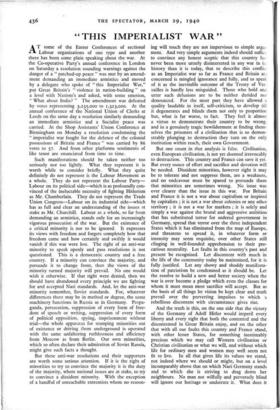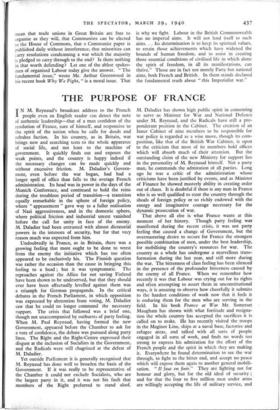"THIS IMPERIALIST WAR "
AT some of the Easter Conferences of sectional Labour organisations of one type and another there has been some plain speaking about the war. At the Co-operative Party's annual conference in London on Saturday a resolution sounding warnings against the danger of a " patched-up peace " was met by an amend- ment demanding an immediate armistice and moved by a delegate who spoke of " this Imperialist War," put Great Britain's " violence in nation-building " on a level with Nazism's and asked, with some emotion, " What about India? " The amendment was defeated by votes representing 3,235,000 to 1,323,000. At the annual conference of the National Union of Clerks at Leeds on the same day a resolution similarly demanding an immediate armistice and a Socialist peace was carried. At the Shop Assistants' Union Conference at Birmingham on Monday a resolution condemning the " imperialist war fought for the defence of the colonial possessions of Britain and France " was carried by 86 votes to 57. And from other platforms sentiments of like tenor are enunciated from time to time.
Such manifestations should be taken neither too seriously nor too lightly. What they represent it is worth while to consider briefly. What they quite definitely do not represent is the Labour Movement as a whole. They do not represent the Labour Party— Labour on its political side—which is as profoundly con- vinced of the ineluctable necessity of fighting Hitlerism as Mr. Chamberlain. They do not represent the Trade Union Congress—Labour on its industrial side—which has as full and clear an understanding of the issues at stake as Mr. Churchill. Labour as a whole, so far from demanding an armistice, stands only for an increasingly vigorous prosecution of the war. But the existence of a critical minority is not to be ignored. It expresses its views with freedom and forgets completely how that freedom came and how certainly and swiftly it would vanish if this war were lost. The right of an anti-war minority to speak openly and pass resolutions is not questioned. This is a democratic country and a free country. If a minority can convince the majority, and persuade it to change front, then the views of the minority turned majority will prevail. No one would wish it otherwise. If that right were denied, then we should have abandoned every principle we are fighting for and accepted Nazi standards. And, let the anti-war minority remember, Soviet standards. For, whatever differences there may be in method or degree, the same machinery functions, in Russia as in Germany. Propa- ganda, persecution, suppression of every form of free- dom of speech or writing, suppression of every form of political opposition, spying, imprisonment without trial—the whole apparatus for stamping minorities out of existence or driving them underground is operated with the same unfaltering ruthlessness and efficiency from Moscow as from Berlin. Our own minorities, which so often declare their admiration of Soviet Russia, might give such facts a thought.
But these anti-war resolutions and their supporters are worth some serious attention. If it is• the right of minorities to try to convince the majority it is the duty of the majority, where national issues are at stake, to try to convince a dissident minority. With the exception of a handful of unteachable extremists whom no reason- ing will touch they are not impervious to simple argu- ment. And very simple arguments indeed should suffice to convince any honest sceptic that this country has never been more utterly disinterested in any war in its history than it is today, that to describe this conflict as an Imperialist war so far as France and Britain are concerned is mingled ignorance and folly, and to speak of it as the inevitable outcome of the Treaty of Ver- sailles is hardly less misguided. Those who hold and utter such delusions are to be neither derided nor denounced. For the most part they have allowed a quality laudable in itself, self-criticism, to develop till it degenerates and blinds them not only to proportion but, what is far worse, to fact. They feel it almost a virtue to demonstrate their country to be wrong, and in a genuinely tragic bewilderment at finding them- selves the prisoners of a civilisation that is so demon- strably plunging to destruction they turn on the only institution within reach, their own Government.
But one count in that analysis is false. Civilisation, even European civilisation, is not yet doomed irrevocably to destruction. This country and France can save it yet. But every ounce of effort and sacrifice and devotion will be needed. Dissident minorities, however right it may be to tolerate and not suppress them, are a weakness, and no endcavour must be spared to persuade them that minorities are sometimes wrong. No issue was ever clearer than the issue in this war. For Britain and France it is not a war about capitalism or inspired by capitalists ; iris not.a war about colonies or any other territory ; it is not a war for markets ; it is solely and simply a war against the brutal and aggressive ambition that has substituted terror for ordered government in Germany, spread that terror over the three independent States which it has eliminated from the map of Europe, and threatens to spread it, in whatever form or intensity may seem requisite, over other States still clinging in well-founded apprehension to their pre- carious neutrality. Let faults in this country's past and present be recognised. Let discontent with much in the life of the community today be maintained, for it is fully justified. Let any showy and shoddy manifesta- tion of patriotism be condemned as it should be. Let the resolve to build a new and better society when the war is over become a pledge which even the classes for whom it must mean most sacrifice will accept. But as the basis of all things let vision be kept clear and truth prevail over the perverting impulses to which a rebellious discontent with circumstance gives rise.
And the truth is this, on the one side that the victory of the Germany of Adolf Hitler would imperil every liberty and every right that both the contented and the discontented in Great Britain enjoy, and on the other that with all our faults this country and France stand, with other lesser States, for something inestimably precious which we may call Western civilisation or Christian civilisation or what we will, and without which life for ordinary men and women may well seem not fit to live. In all that gives life its values we stand, not indeed where we should or might, but on a level incomparably above that on which Nazi Germany stands and to which she is striving to drag down her neighbours. No man not wilfully and perversely blind will ignore our heritage or underrate it. What does it mean that trade unions in Great Britain are free to organise as they will, that Communists can be elected to the House of Commons, that a Communist paper is published daily without interference, that minorities can carry resolutions condemning a war which the majority is pledged to carry through to the end? Is there nothing in that worth defending? Let one of the ablest spokes- men of organised Labour today give the answer. " The fundamental issue," wrote Mr. Arthur Greenwood in his recent book Why We Fight," is a moral issue. That
is why we fight. Labour in the British Commonwealth has no imperial aims. It will not lend itself to such aims. . . Its determination is to keep its spiritual values, to retain those achievements which have widened the bounds of human freedom, and to assist in creating those essential conditions of civilised life in which alone the spirit of freedom, in all its manifestations, can thrive." Those are in fact not merely Party but national aims, both French and British. In them stands declared the fundamental truth about " this Imperialist war."



































 Previous page
Previous page